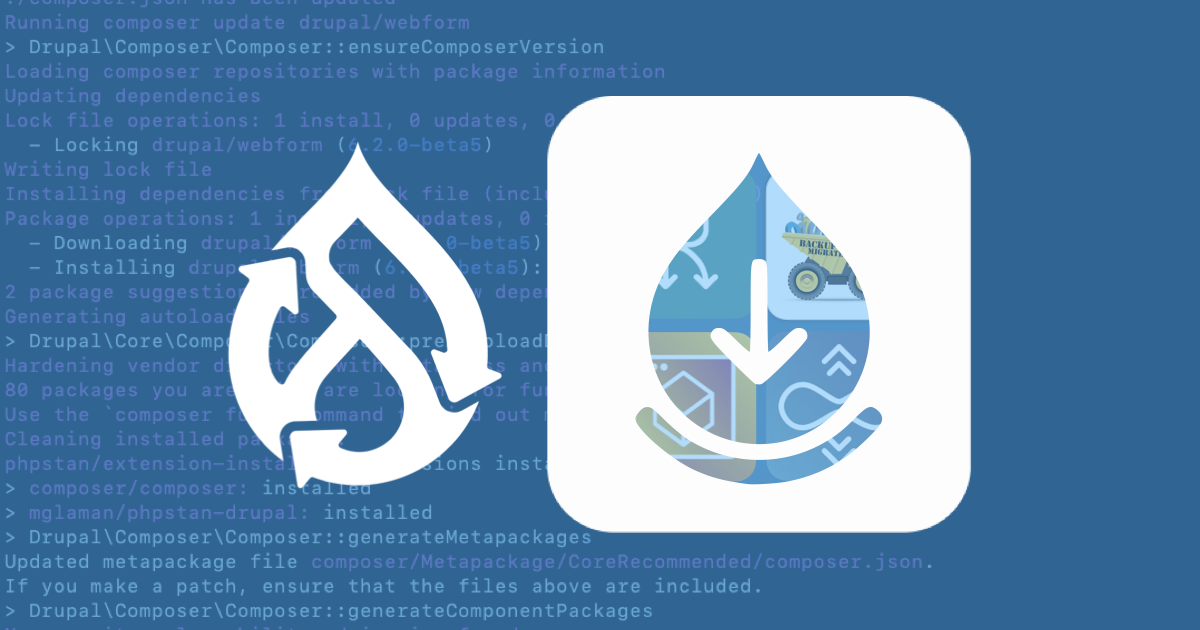Author:
Source
Sponsored:
Working in Public: The Making and Maintenance of Open Source Software - Audiobook

Unlock the Digital Creator Code!
Re-posted with permission from https://dri.es/drupal-cms-1-released.

We did it: Drupal CMS 1.0 is here! 🎉
Eight months ago, I challenged our community to make Drupal easier for marketers, content creators, and site builders. Today, on Drupal’s 24th birthday, we’re making history with the launch of Drupal CMS 1.0.
With this release, you now have two ways to build with Drupal:
- Drupal Core serves expert users and developers who want complete control over their websites. It provides a blank canvas for building websites and has been the foundation behind millions of websites since Drupal began 24 years ago.
- Drupal CMS is a ready-to-use platform for marketing teams, content creators and site builders built on Drupal 11 core. When you install Drupal CMS, you get a set of out-of-the-box tools such as advanced media management, SEO tools, AI-driven website building, consent management, analytics, search, automatic updates and more.
To celebrate this milestone, more than 60 launch parties are happening around the world today! These celebrations highlight one of Drupal’s greatest strengths: a worldwide community that builds and innovates together.
If you want to try Drupal CMS, you can start a free trial today at https://www.drupal.org/drupal-cms/trial.
Built for ambitious marketers
Drupal CMS targets organizations with ambitious digital goals, particularly in mid-market and enterprise settings. The platform provides a robust foundation that adapts and scales with evolving needs.
Organizations often hit a growth ceiling with non-Drupal CMS platforms. What starts as a simple website becomes a constraint as needs expand. Take privacy and consent management as an example: while these features are now essential due to GDPR, CCPA, and growing privacy concerns, most CMS platforms don’t offer them out of the box. This forces organizations to create patchwork solutions.
Drupal CMS addresses this by including privacy and consent management tools by default. This not only simplifies setup but also sets a new standard for CMS platforms, promoting a better Open Web – one that prioritizes user privacy while helping organizations meet regulatory requirements.
Recipes for success
The privacy and consent management feature is just one of many ‘recipes’ available in Drupal CMS. Recipes are pre-configured packages of features, like blogs, events, or case studies, that simplify and speed up site-building. Each recipe automatically installs the necessary modules, sets up content types, and applies configurations, reducing manual setup.
This streamlined approach makes Drupal more accessible for beginners but also more efficient for experienced developers. Drupal CMS 1.0 launches with nearly 30 recipes included, many of which are applied by default to provide common functionality that most sites require. Recipes not applied by default are available as optional add-ons and can be applied either during setup or later through the new Project Browser. More recipes are already in development, with plans to release new versions of Drupal CMS throughout the year, each adding fresh recipes.

The Drupal CMS installer lets users choose from predefined ‘recipes’ like blog, events, case studies and more. Each recipe automatically downloads the required modules, sets up preconfigured content types, and applies the necessary configurations.
Pioneering the future, again
Drupal CMS not only reduces costs and accelerates time to value with recipes but also stands out with innovative features like AI agents designed specifically for site building. While many platforms use AI primarily for content creation, our AI agents go further by enabling advanced tasks such as creating custom content types, configuring taxonomies, and more.
This kind of innovation really connects to Drupal’s roots. In its early days, Drupal earned its reputation as a forward-thinking, innovative CMS. We helped pioneer the assembled web (now called ‘composable’) and contributed to the foundation of Web 2.0, shipping with features like blogging, RSS, and commenting long before the term Web 2.0 existed. Although it happened long ago and many may not remember, Drupal was the first CMS to adopt jQuery. This move played a key role in popularizing jQuery and establishing it as a cornerstone of web development.
Curious about what Drupal CMS’ AI agents can do? Watch Ivan Zugec’s video for a hands-on demonstration of how these tools simplify site-building tasks – even for expert developers.
We don’t know exactly where AI agents will take us, but I’m excited to explore, learn, and grow. It feels like the early days when we experimented and boldly ventured into the unknown.
Changing perceptions and reaching more users
Drupal has often been seen as complex, but Drupal CMS is designed to change that. Still, we know that simply creating a more user-friendly and easier-to-maintain product isn’t enough. After 24 years, many people still hold outdated perceptions shaped by experiences from over a decade ago.
Changing those perceptions takes time and deliberate effort. That is why the Drupal CMS initiative is focused not just on building software but also on repositioning and marketing Drupal in a way that highlights how much it has evolved.

The new Drupal.org features a refreshed brand and updated messaging, positioning Drupal as a modern, composable CMS.
To make this happen, we’ve refreshed our brand and started reworking Drupal.org with the help of the Drupal Association and our Drupal Certified Partners. The updated brand feels fresher, more modern, and more appealing to a larger audience.
For the first time, the Drupal Association has hired two full-time product marketers to help communicate our message.
Our goal is clear: to help people move past outdated perceptions and see Drupal for what it truly is – a powerful, modern platform for building websites that is becoming more user-friendly, as well as more affordable to use and maintain.
Achieving bold ambitions through collaboration
Launching the Drupal CMS initiative was bold and ambitious, requiring extraordinary effort from our community – and they truly stepped up. It was ambitious because this initiative has been about much more than building a second version of Drupal. It’s been a focused and comprehensive effort to expand our market, modernize our brand, accelerate innovation, expand our marketing, and reimagine our partner ecosystem.
When I announced Drupal Starshot and Drupal CMS just 8 months ago, I remember turning to the team and asking, How exactly are we going to pull this off?. We had a lot to figure out – from building a team, setting goals, and mapping a path forward. It was a mix of uncertainty, determination, and maybe a touch of What have we gotten ourselves into?.
A key success factor has been fostering closer collaboration among contributors, agency partners, Drupal Core Committers, Drupal Association staff, and the Drupal Association Board of Directors. This stronger alignment didn’t happen by chance; it’s the result of thoughtfully structured meetings and governance changes that brought everyone closer together.
After just 8 months, the results speak for themselves. Drupal CMS has significantly increased the pace of innovation and the level of contributions to Drupal. It’s a testament to what we can achieve when we work together. We’ve seen a 40% increase in contributor activity since the initiative launch, with over 2,000 commits from more than 300 contributors.

Drupal CMS has been a powerful catalyst for accelerating innovation and collaboration. Since development began in 2024, contributions have soared. Organization credits for strategic initiatives grew by 44% compared to 2023, with individual contributions increasing by 37%. The number of unique contributors rose by 12.5%, and participating organizations grew by 11.3%.
The initiative required me to make a significant time commitment I hadn’t anticipated at the start of 2024 – but it’s an experience I’m deeply grateful for. The Drupal CMS leadership team met at least twice a week, often more, to tackle challenges head-on. Similarly, I had weekly meetings with the Drupal Association.
Along the way we developed new working principles. One key principle was to solve end-user problems first, focusing on what marketers truly need rather than trying to account for every edge case. Another was prioritizing speed over process, enabling us to innovate and adapt quickly. These principles are still evolving, and now that the release is behind us, I’m eager to refine them further with the team.
The work we did together was intense, energizing, and occasionally filled with uncertainty about meeting our deadlines. We built strong bonds, learned to make quick, effective decisions, and maintained forward momentum. This experience has left me feeling more connected than ever to our shared mission.
The Drupal CMS roadmap for 2025
As exciting as this achievement is, some might ask if we’ve accomplished everything we set out to do. The answer is both yes and no. We’ve exceeded my expectations in collaboration and innovation, making incredible progress. But there is still much to do. In many ways, we’re just getting started. We’re less than one-third of the way through our three-year product strategy.
With Drupal CMS 1.0 released, 2025 is off to a strong start. Our roadmap for 2025 is clear: we’ll launch Experience Builder 1.0, roll out more out-of-the-box recipes for marketers, improve our documentation, roll out our new brand to more parts of Drupal.org, and push forward with innovative experiments.
Each step brings us closer to our goal: modernizing Drupal and making Drupal the go-to platform for marketers and developers who want to build ambitious digital experiences — all while championing the Open Web.
Thank you, Drupal community
We built Drupal CMS in a truly open source way – collaboratively, transparently, and driven by community contributions – proving once again that open source is the best way to build software.
The success of Drupal CMS 1.0 reflects the work of countless contributors. I’m especially grateful to these key contributors and their organizations (listed alphabetically): Jamie Abrahams (FreelyGive), Gareth Alexander (Zoocha), Martin Anderson-Clutz (Acquia), Tony Barker (Annertech), Pamela Barone (Technocrat), Addison Berry (Drupalize.me), Jim Birch (Kanopi Studios), Baddy Breidert (1xINTERNET), Christoph Breidert (1xINTERNET), Nathaniel Catchpole (Third and Grove / Tag1 Consulting), Cristina Chumillas (Lullabot), Suzanne Dergacheva (Evolving Web), Artem Dmitriiev (1xINTERNET), John Doyle (Digital Polygon), Tim Doyle (Drupal Association), Sascha Eggenberger (Gitlab), Dharizza Espinach (Evolving Web), Tiffany Farriss (Palantir.net), Matthew Grasmick (Acquia), Adam Globus-Hoenich (Acquia), Jürgen Haas (LakeDrops), Mike Herchel (DripYard), J. Hogue (Oomph, Inc), Gábor Hojtsy (Acquia), Emma Horrell (University of Edinburgh), Marcus Johansson (FreelyGive), Nick Koger (Drupal Association), Tim Lehnen (Drupal Association), Pablo López Escobés (Lullabot), Christian López Espínola (Lullabot), Leah Magee (Acquia), Amber Matz (Drupalize.me), Lenny Moskalyk (Drupal Association), Lewis Nyman, Matt Olivera (Lullabot), Shawn Perritt (Acquia), Megh Plunkett (Lullabot), Tim Plunkett (Acquia), Kristen Pol (Salsa Digital), Joe Shindelar (Drupalize.me), Lauri Timmanee (Acquia), Matthew Tift (Lullabot), Laurens Van Damme (Dropsolid), Ryan Witcombe (Drupal Association), Jen Witowski (Lullabot).
I also want to recognize our Marketing Committee, the Core Committers, the Drupal Association Board of Directors, and the Drupal Starshot Advisory Council, whose guidance and strategic input shaped this initiative along the way.
While I’ve highlighted some contributors here, I know there are hundreds more who shaped Drupal CMS 1.0 through their code, testing, UX work, feedback, advocacy and more. Each contribution, big or small, moved us forward. To everyone who helped build this milestone: THANK YOU!
— Dries Buytaert





